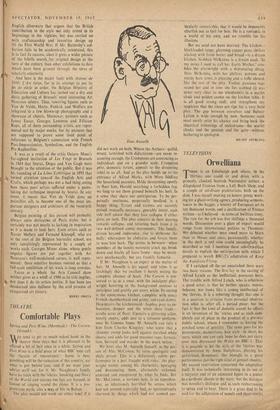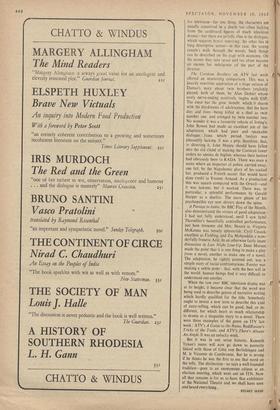TELEVISION
Orwelliana
rritItiRE is an Edinburgh pub where, in the I 'thirties, one could sit and drink with a princely, cloaked Scottish Nationalist author, a dilapidated Etonian from a Left Book Shop, and a couple of soi-disant proletarians, both on the dole. I was myself making an honest penny work- ing for a ghost-writing agency, producing sermons. toasts to the haggis, a history of European art in ten thousand words, and a justification of Franco written—as 1 believed-- in terms of Swiftian irony. The rate for the job was five shillings a thousand words, Discussion over a glass of export would range from international politics to Thomism. We debated whether man owed more to Marx than to Moses and once, passionately, whether in the dark a red rose could meaningfully be described as red. I mention these sub-Orwellian details to explain the anticipation with which I prepared to watch BBC-2's adaptation of Keep the Aspidistra Flying.
If I switched off the set unsatisfied there were two basic reasons. The first lay in the casting of Alfred Lynch as the ineffectual, poetaster hero. The trouble with Alfred Lynch, who is otherwise a good actor, is that he neither speaks, moves, behaves, nor looks like a young intellectual of the 'thirties. It is a sobering thought that one is in a position to criticise from personal observa- tion what is, after all, a period piece; but the fact is that the kind of demotic accent he affects is an invention of the 'sixties and as such com- pletely out of place in the product of a pre-war public school, whom 1 remember as having the pinched tones of gentility. The same goes for his movements, mannerisms, hair style--in short, his aura, which one can only hope he does not carry over into Hereward the Wake on BBC-I. That it is possible to hit the style of 'the 'thirties was demonstrated by Anne Stallybrass, playing his girl-friend, Rosemary. She brought to a good performance just the right kind of genteel chastity. My second reservation concerned the adaptation itself. It was technically interesting in its use of a narrator and of an animated figure in a poster as a sardonic chorus to the story; but the dialogue was novelist's dialogue and as such embarrassing to speak and to hear. There is a great deal to be said for the adaptation of novels and short stories for television—for one thing, the characters are usually conceived in a depth too often lacking from the cardboard figures of much television drama—but there are pitfalls. One is the dialogue, which requires brutal rewriting; the other lies in long descriptive scenes—in this case, the young couple's walk through the woods. Such things can be described on the page with economy. On the screen they take space and too often become an excuse for indulgence on the part of the director.
The Corsican Brothers on ATV last week offered an interesting comparison. This. was a
heavily rewritten adaptation of a stage version of Dumas's story about twin brothers (stylishly played, both of them, by Alan Dobie) whose every nerve-ending positively tingles with ESP.
The piece has the great benefit, which it shares with the daydreams of adolescence, that the hero dies and lives—being killed in a duel as twin number one and avenged by twin number two. No wonder it was a favourite vehicle of Irving's.
John Bowen had made an excellent job of the adaptation. which had pace and speakable dialogue from which period fustian was pleasantly lacking. it was a pity, therefore, that, in directing it, John Moxey should have fallen into the old cliché of making the Corsican lower orders no speaka de Inglish, whereas their betters had obviously been to RADA. There was even a scene where an inspector of police, carried away, one felt, by the Napoleonic glory of his cocked hat, produced a French accent that would have done credit to Yvonne Arnaud. As a production this was square compared with the Orwell—and it was hokum; but it worked There was, in particular, a splendid performance by Gerald Harper as a duellist. The mere gleam of his psychopathic eye sent shivers down the spine.
A Passage to India, the BBC Play of the Month, also demonstrated the virtues of good adaptation.
I had not fully understood, until I saw Sybil Thorndike's beautifully controlled performance, just how tiresome old Mrs. Moore is. Virginia McKenna was tensely spinsterish; Cyril Cusack excellent as Fielding, and Zia Mohyeddin a won- derfully frenetic Aziz,. In an otherwise fairly inane
discussion in Late Night Line-Up, Dom Moraes made the point that it is one thing to make a play from a novel, another to make one of a novel.
The adaptation, he rightly pointed out, was a simple story of racial confrontations; Forster was making a subtle point : that, with the best will in the world, human beings find it very difficult to understand one another.
When the row over BBC television drama was at its height, it became clear that the word was being used to describe genres of narrative writing which hardly qualified for the title. Somebody ought to invent a new term to describe this kind of story-telling, which can be good, bad, or in- different, but which bears as much relationship to drama as a magazine story to a novel. There
were three examples of the genre on ITV last week : ATV's A Guide to the Ruins, Rediffusion's Tricks of the Trade, and ATV's There's Always An Angle. It was an unlucky week.
. But it was in one sense historic. Kenneth Tynan's name will now go down to posterity
linked with those of Gotz von Berlichingen and M. le Vicomte de Cambronne. But he is wrong if he thinks he was the first to use that word on
the telly. The distinction—so says a well-founded tradition—goes to an anonymous citizen at an election meeting, which went out on ITN. Now all that remains is for us to have that exhibition at the National Theatre and we shall have seen and heard everything. r



































 Previous page
Previous page